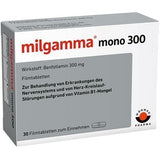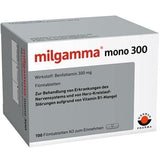MILGAMMA mono 300 benfotiamine, Anxiety, Back pain
milgamma ® mono 300 film-coated benfotiamine, Anxiety, Back pain tablets
active ingredient: benfotiamine 300 mg.
Areas of application: Therapy or prophylaxis of clinical vitamin B1 deficiencies, if these cannot be remedied nutritionally; Treatment of neuropathies and cardiovascular Sturgeon, d. caused by vitamin B1 deficiency.
For benfotiamine, Anxiety, Back pain information on risks and side effects, read the package insert and ask your doctor or pharmacist.
Wörwag Pharma GmbH & Co. KG, 71034 Boeblingen
milgamma ® mono 300 benfotiamine, Anxiety, Back pain
With vitamin B1 deficiency neuropathy
Your choice for nerve damage (neuropathies) caused by vitamin B1 deficiency. Milgamma ®mono 300 compensates for the vitamin B1 deficiency. This can alleviate the symptoms that accompany nerve damage, such as tingling, burning and numbness in the feet. The vitamin B1 active ingredient benfotiamine in milgamma ® mono 300 is particularly well absorbed by the body.
milgamma ® benfotiamine, Anxiety, Back pain mono 300
• Against tingling, burning, numbness in the feet
• Compensates for vitamin B1 deficiency
• Suitable for diabetics, well tolerated, lactose and gluten-free
• Only 1x tablet daily
• With vitamin B1 deficiency, neuropathy
Also suitable for diabetics: Diabetics have an increased risk of a vitamin B1 deficiency and associated nerve damage. It pays to act early.
For therapy or prophylaxis of clinical vitamin B1 deficiency states.
Active benfotiamine, Anxiety, Back pain ingredients
- 300 mg benfotiamine
Auxiliary benfotiamine, Anxiety, Back pain materials
- Cellulose, microcrystalline
- talc
- Povidone K30
- Silica, finely divided
- Croscarmellose sodium
- Partial glycerides, long-chain
- Hypromellose
- Titanium dioxide
- Macrogol
- Sodium saccharine
Indication / benfotiamine, Anxiety, Back pain application
- The medicine is a vitamin preparation.
-
field of use
- Secure areas of application for the monopreparations are exclusively therapy or prophylaxis of clinical vitamin B1 deficiencies, if these cannot be remedied in terms of nutrition.
-
The clinically proven vitamin B1 deficiency can occur in:
- Malnutrition and malnutrition (e.g. beriberi), long-term parenteral nutrition, zero diet, hemodialysis, malabsorption, chronic alcoholism (alcohol-toxic cardiomyopathy, Wernicke encephalopathy, Korsakow syndrome), increased need (e.g. pregnancy and lactation).
- Treatment of neuropathies and cardiovascular disorders caused by vitamin B1 deficiency.
dosage
- Always take the medicine exactly as described in the package leaflet or as your doctor or pharmacist has agreed.
- Please ask your doctor or pharmacist if you are not sure.
-
The following information applies unless your doctor has prescribed the preparation otherwise. Please adhere to the intake instructions, otherwise the tablets may not work properly!
- The recommended dose is 1 film-coated tablet once a day.
- For the treatment of neuropathies, the preparation should initially be taken over a period of at least 3 weeks. Subsequently, further treatment takes place according to the therapeutic success.
-
Duration of application
- The duration of the intake depends on the therapeutic success.
- If after four weeks no or too little effect is noticeable, the treatment of the symptoms should be checked.
- Please talk to your doctor or pharmacist if you have the impression that the effect is too strong or too weak.
-
If you take more than you should:
- In general, no medical intervention is required.
-
If you forget to take a dose
- Do not take a double dose to make up for a forgotten dose. Try to take the medicine regularly in the future.
-
If you stop taking it
- If you stop taking the drug, you risk the success of the treatment.
- If you experience any unpleasant side effects, talk to your doctor about further treatment.
- If you have any further questions on the use of the medicine, ask your doctor or pharmacist.
way
- The film-coated tablets are swallowed whole with some liquid.
Side benfotiamine, Anxiety, Back pain effects
- Like all medicines, this can also have side effects, but not every person treated will experience them.
-
When evaluating side effects, the following frequencies are used as a basis:
- Very common: affects more than 1 in 10 people
- Common: affects 1 to 10 users in 100
- Uncommon: affects 1 to 10 users in 1,000
- Rare: affects 1 to 10 users in 10,000
- Very rare: less than 1 user in 10,000
- Not known: frequency cannot be estimated from the available data
-
Significant side effects or signs to look out for and what to do if they're affected:
- If you are affected by any of the side effects listed below, stop taking the product and contact your doctor as soon as possible.
- In individual cases, hypersensitivity reactions can occur (hives, skin rash).
- Individual cases of gastrointestinal disorders such as: B. Nausea or other complaints are documented. A causal relationship with vitamin B1 and a possible dose dependency have not yet been sufficiently clarified.
- If you get any side effects, talk to your doctor, pharmacist or nurse. This also applies to side effects not listed in this leaflet.
Benfotiamine, Anxiety, Back pain Interactions
-
Taking with other medicines:
- Tell your doctor or pharmacist if you are taking, have recently used, or may use any other medicines.
- Thiamine is inactivated by 5-fluorouracil (an active ingredient used to treat cancer) because 5-fluorouracil competitively inhibits the phosphorylation of thiamine to thiamine pyrophosphate.
Benfotiamine, Anxiety, Back pain Contraindications
-
Do not take the medicine if you
- are allergic to benfotiamine, thiamine (chemical name for vitamin B1), or any of the other ingredients in this medicine.
pregnancy Benfotiamine, Anxiety, Back pain
and breast feeding period
- Ask your doctor or pharmacist for advice before taking this medicine if you are pregnant or breast-feeding, if you suspect you may be pregnant or planning to become pregnant.
-
pregnancy
- If you are pregnant, this medicine is only useful for treating a proven vitamin B1 deficiency due to the amount of active ingredient. Therefore, you may only use the preparation if your attending doctor considers this to be absolutely necessary. During pregnancy, the recommended daily intake for vitamin B1 is 1.2 mg in the 2nd trimester and 1.3 mg in the 3rd trimester. The safety of using a dose higher than the recommended daily dose has not yet been proven.
-
Breastfeeding
- If you are breastfeeding, this medicine is only useful for treating a proven vitamin B1 deficiency due to the amount of active ingredients it contains. Therefore, you may only use the preparation if your attending doctor considers this to be absolutely necessary. The recommended daily intake for vitamin B1 is 1.3 mg during breastfeeding. The safety of using a dose higher than the recommended daily dose has not yet been proven. Vitamin B1 passes into breast milk.
Patient Benfotiamine, Anxiety, Back pain information
-
Driving and using machines:
- There are no special precautions required.




